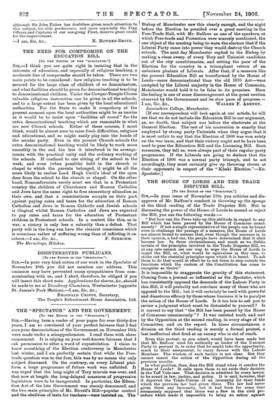THE NEED FOR COMPROMISE ON THE EDUCATION BILL.
LT O THII EDITOR OF THE "SPECTATOR."]
SIR,—I think you are quite right in insisting that in the interests of education, and especially of religious teaching, a moderate line of compromise should be taken. There are two main points to be considered : how religious teaching is to be secured for the large class of children of no denomination, and what facilities should be given for denominational teaching to denominational children. Under the Cowper-Temple Clause valuable religious instruction can be given in all the schools, and to a large extent has been given by the local educational authorities. For the State to make it compulsory at the present moment upon the local authorities might be as unwise as it would be to insist upon "facilities all round" for the extra denominational teaching which are reasonable in what are now Church schools. Either of these courses, I must think, would be almost sure to raise fresh difficulties, religious and educational, and so might easily play into the hands of the secular party. Even in the present Church schools the extra denominational teaching would be likely to work more smoothly in the end the less it interfered in its arrange- ments with the practical unity and the ordinary working of the schools. If confined to one sitting of the school in the week, and even (when possible) held in the church or chapel to which the parents belonged, it might be all the more likely to realise Lord Hugh Cecil's ideal of the open door from the school to the church or chapel. On the other hand, Nonconformists surely must see that in a Protestant country the children of Churchmen and Roman Catholics and Jews have the same right to free elementary education as their own, and that a conscientious scruple on their part against paying rates and taxes for the education of Roman Catholics and Jews in Roman Catholic and Jewish schools is illogical whilst Roman Catholics and Jews are expected to pay rates and taxes for the education of Protestant children in Protestant schools. In a contest like this, as in war, a victory is only less a calamity than a defeat That party will in the long run have the clearest conscience which is conscious rather of suffering wrong than of inflicting it on














































 Previous page
Previous page